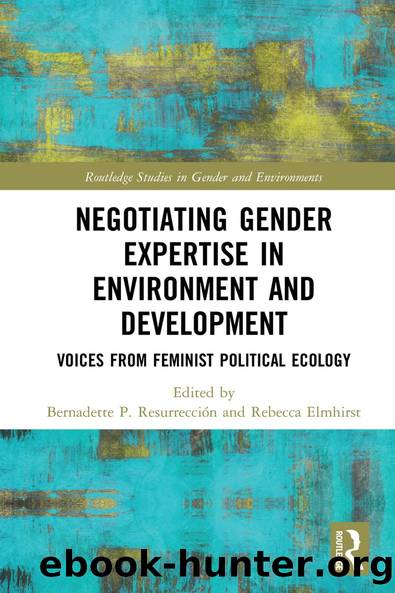Negotiating Gender Expertise in Environment and Development by Bernadette P. Resurrección Rebecca Elmhirst

Author:Bernadette P. Resurrección, Rebecca Elmhirst [Bernadette P. Resurrección, Rebecca Elmhirst]
Language: eng
Format: epub
ISBN: 9780815386124
Barnesnoble:
Publisher: Taylor & Francis
Published: 2020-12-21T00:00:00+00:00
To conclude
Our analysis suggests that the incentive structure and professional culture that prevails in most public water bureaucracies stands in the way of achieving the goals of womenâs inclusion or empowerment. Public water professionals â the large majority of whom continue to be engineers and men â are formally rewarded and informally appreciated for the construction work that they do, or for the number of the projects they are involved in. Professional engineering cultures tend to naturalise or normalise associations between professional performance and masculinity, making it difficult for women to become respected members of the professional water community. The gender experts in water development projects often lack the political clout to change the terms of dialogue with their technical colleagues, as their work is often considered marginal to the main task of achieving water productivity.
We end this discussion with the view that there are different and hierarchical ways of knowing in the water sector, where epistemic privilege mostly still lies in creating physical and institutional conditions for water productivity to serve market-driven ends, rather than for purposively democratic and gender-just water distribution. Integrated water resource management has served as a popular vehicle to merge these types of knowledge and tie them to a strong participatory ethic. Years of observing the application of these approaches through the creation of water user and other water subsidiary groups have led us to conclude that just and re-distributive aspects of water continue unaddressed. Indeed, there may be a need to re-think the widely used view of âintegrationâ and shift instead to recognising the constancy of irreconcilable difference and contestation around water as a resource â or even better, seek more creative and promising ways of co-producing knowledge that recognises that there is more than one way of knowing.
Download
This site does not store any files on its server. We only index and link to content provided by other sites. Please contact the content providers to delete copyright contents if any and email us, we'll remove relevant links or contents immediately.
Cecilia; Or, Memoirs of an Heiress — Volume 1 by Fanny Burney(32547)
Cecilia; Or, Memoirs of an Heiress — Volume 2 by Fanny Burney(31945)
Cecilia; Or, Memoirs of an Heiress — Volume 3 by Fanny Burney(31931)
The Great Music City by Andrea Baker(31917)
We're Going to Need More Wine by Gabrielle Union(19034)
All the Missing Girls by Megan Miranda(15958)
Pimp by Iceberg Slim(14488)
Bombshells: Glamour Girls of a Lifetime by Sullivan Steve(14057)
For the Love of Europe by Rick Steves(13912)
Talking to Strangers by Malcolm Gladwell(13349)
Norse Mythology by Gaiman Neil(13348)
Fifty Shades Freed by E L James(13232)
Mindhunter: Inside the FBI's Elite Serial Crime Unit by John E. Douglas & Mark Olshaker(9324)
Crazy Rich Asians by Kevin Kwan(9277)
The Lost Art of Listening by Michael P. Nichols(7494)
Enlightenment Now: The Case for Reason, Science, Humanism, and Progress by Steven Pinker(7306)
The Four Agreements by Don Miguel Ruiz(6744)
Bad Blood by John Carreyrou(6611)
Weapons of Math Destruction by Cathy O'Neil(6265)
